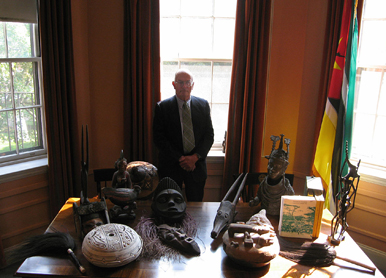APARC Donation
Robert Ward donates resources for scholars studying economic development in African nations

Retired banker Robert Ward made economic development deals with emerging African nations over 40 years, gaining a lifetime of experience on that continent. He decided to share that experience with BU, and on September 11 announced the donation of a trove of art and documents to the Boston University African Presidential Archives and Research Center (APARC).
The gift includes more than 200 books and 300 unpublished plans and policies describing industrial projects, such as a glass factory in east Nigeria, the Jebba Dam on the Niger River, and agricultural development in Tanzania. Together they will be a valuable resource for scholars studying economic development in African nations, says Charles Stith, APARC’s founder and director and a former U.S. ambassador to Tanzania.
“It’s an important addition to our existing archives, because it adds to our body of knowledge about the transactions, deal structures, and successes and failures of economic development during a critical period in Africa’s history,” says Stith. The documents span nearly four decades of Africa’s post-liberation period, when many countries were emerging from colonial rule and the United States and the former Soviet Union were engaged in Cold War politics.
The art, which Ward and his wife purchased over 55 years, includes a Bambara headdress from Mali, Shona stone sculptures from Zimbabwe, and a Yoruba Eshu cult figure from Nigeria. APARC archivists will catalog the collection and put it on computer, then publish an inventory on the center’s Web site, making the material available to a global community of students, researchers, and history buffs, Stith says.
Ward graduated from Johns Hopkins University in 1957 and went to Africa in 1959, convincing his wife of two weeks to move to Liberia. As an investment advisor to countries like Nigeria, he worked with newly independent governments to create economic growth by helping state-owned factories become self-reliant private companies.
He decided to donate his memorabilia after auditing a class through the University’s Evergreen Program, which allows senior citizens to sit in on undergraduate courses and seminars. After a professional career brokering foreign deals for the consulting firm Arthur D. Little, Citibank, and the Bank of Boston, the 75-year-old Ward wanted to learn how recent events had changed the countries where he once lived and worked.
He chose Stith’s course Africa and Globalization: Opportunities and Obstacles, and a class taught by Elizabeth Prodromou, a College of Arts and Sciences assistant professor of international relations, on Turkey and the European Union. Ward says he valued the opportunity to study alongside current undergraduates and to share his experience with them.
“His willingness to share his perspectives added to the richness of discourse in my class,” Stith says, “and made things come alive in a way that they don’t when you only read books.”
It was that exchange of ideas that convinced Ward to donate the art and documents to APARC. “I wanted to have the collection permanently on display, where students can see it and touch it, instead of being stored in a museum where they might put it in a box,” he says. “That happens so often and it really bugs me.”